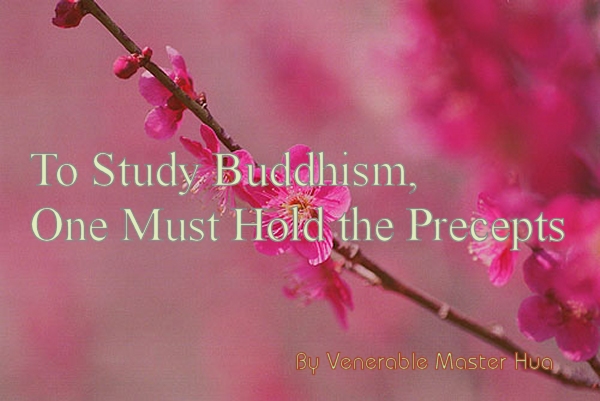
|
 |
|
One can tell whether or not people hold the precepts by looking at whether or not they cry, whether they are emotional, and whether they lose their tempers. No matter how long we have studied Buddhism and how many Sutras from the Three Treasuries and Twelve Divisions of the Buddhist Canon we have studied, the first thing we must do is control our emotions. Controlling our emotions just means holding the precepts. If you hold the precepts, you will not cry. People who don't uphold the precepts cry often.
If you truly hold the precepts, what is there to fight about? What is there to argue about? If you don't place importance on the precepts, then you are only heading toward the hells and won't be able to get out. You can fool others, but you can't fool yourself. If you truly hold the precepts, then first of all, you will no cry. Does that mean you'll always be laughing? No. I've told you before: Don't let your knees shake when sitting; don't whirl your skirt when standing; don't laugh hysterically when you're happy; and don't yell or raise your voice when you're angry. As it's said, we should "think before speaking, laugh only when there is cause for joy, and make sure it is proper before we take something." We should always be considerate of others and not just think of ourselves.
Therefore, in studying Buddhism, we must emphasize the observance of precepts. Holding the precepts means watching for and correcting your own mistakes at all times; it doesn't mean minding others' mistakes and not doing anything to correct your own--that would be like doing other people's dirty laundry. I've said these things to you today out of earnest concern; they are meant to help you leave suffering and attain happiness, and end birth and death. If you understand the spirit of my words, then you will all be able to carry on. If you do not understand, then I cannot save you. Even if Shakyamuni Buddha himself came, he probably couldn't save you if you are too confused by your emotions. I've spoken very honestly, and you should listen earnestly; don't try to be too clever -- like a ghost. A talk given on October 21,1985 |
 Those
who hold the precepts refrain from all evil and practice all good. Crying
is one of the evils committed by the body. It's like the weapons wielded
by bandits--it can kill. And it's a very inauspicious sign. If you hold
the precepts, you won't cry all the time. One can tell whether or not
people hold the precepts by looking at whether or not they cry, whether
they are emotional, and whether they lose their tempers. If you understand
the precepts, you will be able to deeply penetrate the Buddhadharma
in its entirety. If you do not understand the precepts, you'll just
be like a cloud in the sky, drifting here and there without any roots
or foundation. As students of the Buddhadharma, we will find that all
Sutras teach people to hold the precepts, and none teach people to assume
an affected manner, to do things to excess or to fight or argue.
Those
who hold the precepts refrain from all evil and practice all good. Crying
is one of the evils committed by the body. It's like the weapons wielded
by bandits--it can kill. And it's a very inauspicious sign. If you hold
the precepts, you won't cry all the time. One can tell whether or not
people hold the precepts by looking at whether or not they cry, whether
they are emotional, and whether they lose their tempers. If you understand
the precepts, you will be able to deeply penetrate the Buddhadharma
in its entirety. If you do not understand the precepts, you'll just
be like a cloud in the sky, drifting here and there without any roots
or foundation. As students of the Buddhadharma, we will find that all
Sutras teach people to hold the precepts, and none teach people to assume
an affected manner, to do things to excess or to fight or argue. When
we study Buddhism, the first thing we must do is hold. the precepts.
Why is a person able to refrain from crying and laughing? Because he
or she has samadhi. People who lack samadhi easily cry and laugh. If
you have samadhi, you will have wisdom. If you lack samadhi, this means
you aren't holding the precepts, and then even if you say you have wisdom,
it's useless.
When
we study Buddhism, the first thing we must do is hold. the precepts.
Why is a person able to refrain from crying and laughing? Because he
or she has samadhi. People who lack samadhi easily cry and laugh. If
you have samadhi, you will have wisdom. If you lack samadhi, this means
you aren't holding the precepts, and then even if you say you have wisdom,
it's useless.